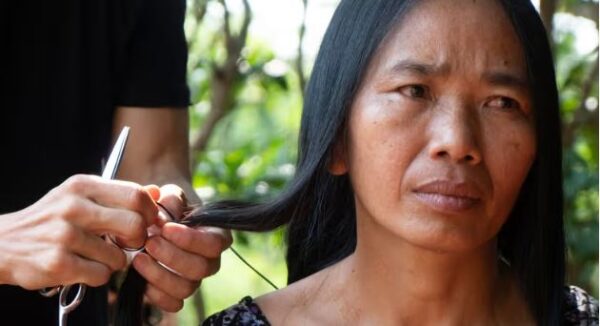Lifestyle
Wig business: 4 unethical ways human hair are gotten and made

The human hair wig business is a thriving market, with thousands of Africans and people of African descent choosing to wear wigs for a variety of reasons. These reasons include aesthetics (wigs look beautiful) and practicality (they offer ease of use).
Many women are willing to spend a significant amount on human hair wigs. In south Africa, for example, quality wig prices can range from R2500 to R12000.
However, a major concern lies in the often exploitative sourcing of these wigs. A viral video earlier this year showed wig vendor cutting off a woman’s hair, and paying her some money so she can resell it.
While this incident sparked a social media outcry, it’s not the most unethically problematic way human hair is sourced.
Here are unethical practices in the wig industry
1. Exploitation in conflict zones
Scammers take advantage of desperate women in war-torn regions, offering them peanuts to cut their hair, which is then sold at a premium to wealthy clients. These women, facing dire circumstances, have little choice but to exchange their hair for necessities.
Refinery 29 reports that hair exports are booming in countries like Myanmar, Ukraine, Venezuela, and Tunisia, which have been ravaged by conflict. “Russian hair” is even geotagged from within conflict zones on social media, and some Russian military personnel reportedly engage in the hair trade as a side hustle.
Venezuela’s economic forced women to walk to the Colombian border, where they can sell their hair for a little money. Tunisia, a country that has faced instability since the Arab Spring, has also become a hotspot for hair exports.
2. Violent theft of hair
An investigative article in Refinery 29 stated that there are many women and children in Venezuela, India, South Africa, Ukraine, Myanmar, and other places assaulted for their hair. They are held down as robbers violently chop off their ponytails at gunpoint or with a knife.
These people resort to violence because gathering a significant quantity of high-quality hair necessitates women giving it willingly; therefore, hair dealers typically move from area to area, buying hair from marginalised women until the supply runs out, so they attack and cut it off involuntarily.
3. Selling fake hair
Virgin hair, unprocessed and considered to be smoother, healthier, and longer-lasting is highly sought-after. However, the industry resorts to deceptive practices due to high demand exceeding supply.
Refinery 69 discovered through their investigations that hair companies may chemically treat lower-quality hair to mimic virgin hair. They do not only sell fake hair but they put factory workers’ health at risk with these chemicals.
4. Women sell their hair for pennies
Women in Asia with long hair save their hair from combing or washing, selling it to pedlars. BBC reports that it is sold for 80 pennies, or $1. The hair is gathered and passed from trader to trader, eventually ending up in hair-untangling workshops in Bangladesh, India, and Myanmar. The labour-intensive process takes around 80 hours to untangle 1.5 kg of hair.
Finally, there is something inhumane when a person has to give up a part of their body to be able to afford food; it feels like human organ trafficking, although it isn’t necessarily that extreme.






